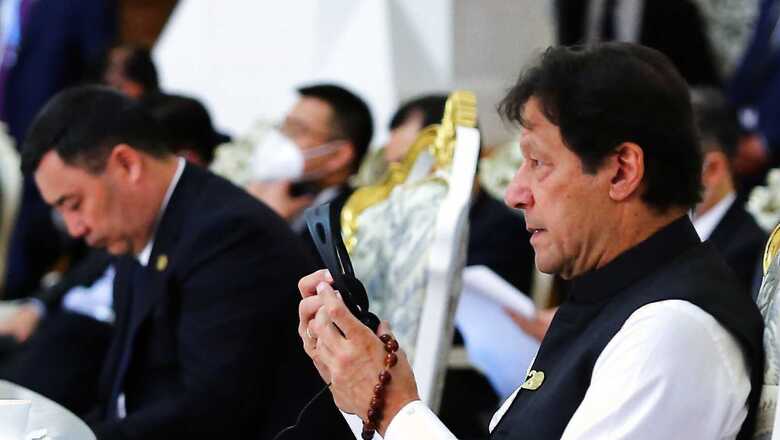Pakistan's National Security Policy is Full of Wishful Thinking, Starkly Unrelated to Ground Reality

views
The National Security Policy (NSP) document for the period 2022 to 2026 released by Pakistan on January 14 reveals very little about how it seeks to achieve the comprehensive political, economic, social and other goals set out in it. The document is full of wishful thinking, starkly unrelated to the ground realities of Pakistan today. Almost all that it contains by way of aspirations cannot be achieved in five years, or for that matter anytime in the foreseeable future.
The “idea” of Pakistan will have to change radically to achieve even a fraction of the ambitions laid out in the document. It is the “idea” of a country that did not exist before 1947 that is at the root of Pakistan’s condition today. That “idea” is regressive, with its two pillars of Islamism and hostility towards India.
And this “idea” perdures as the article by Imran Khan in The Tribune on January 17 shows, in which he once again outlines his concept of Riyasat-i-Madina as the road to Pakistan’s future and unleashes his venom against India. He thinks that the State should not be neutral about good and evil as conceived by religion (the State becomes a Grand Mufti then), and that knowledge should be combined with spiritual transformation (Pakistan’s knowledge economy will grow in madrasas obviously).
Imran Khan lauds China as a country where there is robust application of the rule of law as against India where the “apartheid rule of law has immediately brought about poverty and countless insurgencies attributable to a lack of rule of law”. (That he can have such obtuse views about the rule of law in China shows a glaring political and mental deficiency).
He also indirectly takes a swipe at the West which, according to him, subverts Pakistan’s values using Pakistan’s own educational institutions and channels of information. His goal for Pakistan is moderate prosperity and consumption, unlike in the West. It would seem that Pakistan’s goal and ambitions as reflected in the National Security Policy and Imran Khan’s vision are marked by schizophrenia.
As an instance of the empty platitudes in the NSP is Imran Khan’s pious claim in his prefatory comments in the policy that regional peace is based on regional connectivity and shared prosperity. Pakistan nonetheless continues to deny westward connectivity to India with the geopolitical objective of preventing us from obtaining access to Afghanistan and Central Asia. It refuses to take serious steps to normalise trade ties with India and accord us MFN treatment.
More than that, in the broader regional context, it has prevented SAFTA from becoming a reality because of bilateral differences with India. The document speaks of Pakistan privileging national interest over emotive policy making, when its policy is laced with emotions of hate towards India and its leadership, which Imran Khan has carried to a new level.
The NSP foresees Pakistan aligning itself with principles of justice, equality and tolerance. With its judges infected with Islamism, feudalism still blemishing its society and the rampant intolerance towards minorities, including Shias and Ahmediyas, these goals are distant. How will external economic dependency decrease, as is hoped for, with increasing dependency on China with the China-Pakistan Economic Corridor?
The NSP talks of preserving the Islamic character of Pakistan, which is a euphemism for becoming more radical. At the same time, it speaks of a policy of zero tolerance of any group involved in terrorist activity on its soil. This flies against the reality of the protection given to LeT, JeM, long years of succour to the Taliban, and the terrorist tanzeems poised even now in launch pads across the LoC in Kashmir.
It mentions promoting inter-faith harmony and minority rights, which is a dishonest bow to virtue given its persecution of Hindus and Christians and the existence and abuse of the blasphemy laws that target them. Its definition of east-west connectivity seems geographically constricted, with the east beginning with Pakistan and excluding India.
The India fixation of Pakistan is well reflected in the NSP. India is accused of ceasefire violations. Reference is made to a regressive and dangerous ideology gripping India (ironic coming from an increasingly radicalised Islamic state that spawns and supports terrorist groups).
Prospects of a violent conflict are stated to have grown immensely, with the use of force by India as a deliberate policy choice not ruled out. The “self-professed role of India as a so-called net security provider in the broader Indian Ocean” is rejected. The strategic balance has been disturbed, according to the document.
India’s hegemonistic designs, the illegal and unilateral action of August 2019 rejected by the people of J&K, human rights violations, war crimes against humanity and genocidal acts in J&K — all form part of the NSP, which still harps on the right of self-determination for Kashmir in accordance with the UNSC resolutions.
Unable to move out of a groove despite the needles getting worn out by repeated playing of its Kashmir disc, the NSP describes a just and peaceful solution of the J&K dispute as the core of the bilateral relationship. The rise of Hindutva-driven politics is seen as impacting Pakistan’s security. (Naturally, the jihadi politics of Pakistan is not considered as impacting India’s security).
Fear of non-contact warfare is expressed; exception is taken to the exception made for India in non-proliferation rules (no introspection about China’s nuclear collaboration with Pakistan despite no exception made for it by the NSG).
The mention of employment of terrorists as a preferred policy choice of hostile actors and exploitation of fringe sub-nationalist tendencies by hostile actors can be construed as indirect references to India. Interestingly, the NSP notes that 80% of the Indus Water Basin originate outside Pakistan but there is no reference to the Indus Waters Treaty issues that Pakistan rakes up.
The NSP includes relations with the US in the chapter on ties with other countries. A far cry from the time that Pakistan relied on three As — Allah, Army and America. Now the three As seem to be Allah, Army and Angst!
It defiantly says Pakistan will not be a “camp follower”, depending of course on which camp. Not much is said about China, surprisingly, despite the growing dependence on it. Ties with Russia will be “re-imagined”, with the focus on energy, defence cooperation and investment. Improving defence cooperation with Turkey is envisaged.
The NSP as released is highly redacted, which is why it reads like a compilation of desirable solutions to existing problems, those that would look good on paper and outline a reform agenda irrespective of whether they are realisable without a complete overhaul of the governance of the country.
What does citizen-centric NSP mean in a country in which civil-military relations remain fraught, democracy is fragile, sectarian terrorism blots the social landscape, the government and the military are forced to bend to the street force of extremist religious groups, the northwestern parts of the country are not fully settled, ethnic groups are in revolt, the state education system functions poorly, religious education breeds misfits and so on? The public document acknowledges that the NSP exercise is aspirational and the gap between ambition and reality has to be bridged.
The NSP says that specific details and analyses of the security landscape, priority actions and the implementation framework is not in the public document. If “economic security is at the core” of the NSP, it is not clear why that part of the agenda has not been elaborated in the public document and practical solutions offered rather than merely stating all that needs to be done in theory.
One should not be impressed by claims that Pakistan has moved away from geo-politics to geo-economics as some in our think-tank and media circles are prone to buying into. It is possible that some introspection is going on in Pakistan circles about the state of the country. But what the Pakistan establishment can realistically do to change the course of Pakistan’s internal and external policies without a radical change of mindset and internal power balances is difficult to imagine.
Judging by the animus against India that comes out in the public document it would be foolish to believe that the confidential document will contain any constructive approach to India. Without that, no real course correction of Pakistan’s national security policy will be possible and we in India should be wary of the 89% of the iceberg that we do not see.
The author is Former Foreign Secretary. He was India’s Ambassador to Turkey, Egypt, France and Russia. The views expressed in this article are those of the author and do not represent the stand of this publication.
Read all the Latest Opinions here

















Comments
0 comment